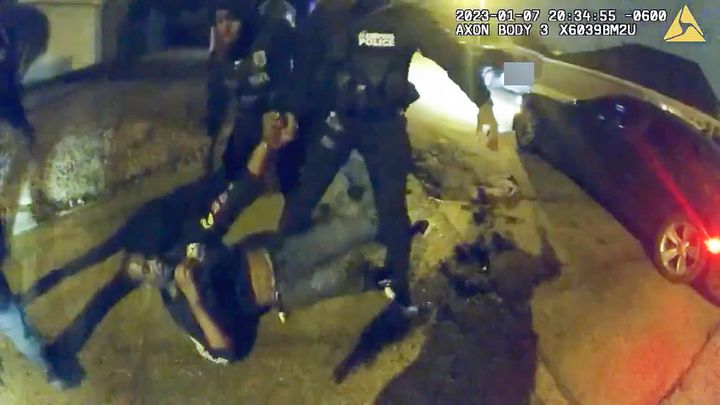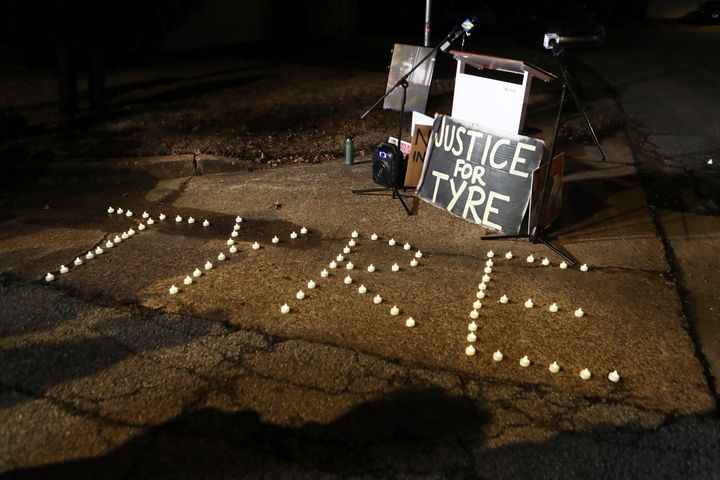
MEMPHIS — Memphis Police Department Lt. Larnce Wright said Thursday that three former officers charged in the death of Tyre Nichols, a 29-year-old Black man, did not follow department policy when they beat him in January 2023 — testimony that contradicted the argument presented by defense attorneys earlier in the week.
Nichols died three days after being beaten by Memphis police officers following a traffic stop. Two of the officers involved, Emmitt Martin and Desmond Mills Jr., have already pleaded guilty to federal charges related to the incident. The trial for three others who face federal conspiracy and civil rights charges — Tadarrius Bean, Justin Smith and Demetrius Haley — began this week.
In the courtroom, prosecutor Kathryn Gilbert played body camera footage from the night of Jan. 7, 2023, which showed officers beating Nichols. She paused the video and asked Wright if the use of force displayed in the footage was consistent with Memphis police training.
“No, ma’am,” replied Wright, who has been training Memphis police officers for seven years. “It is not consistent with our training.”
Wright listed physical techniques all Memphis police recruits are taught during their training academy, including open- and closed-hand strikes and two types of kicks — all of which Wright said officers would only be authorized to use if a civilian posed a threat.
But Nichols never posed a threat, Wright said. More than that, he noted, officers continued to strike Nichols while one of his arms was being held by officers and he was nearly defenseless, which was a violation of departmental policy.
Wright said the footage showed Martin kicking Nichols in the head as officers took turns beating him while placing him in handcuffs. Bean and Smith held Nichols’ arms.
Haley then kicked Nichols in his upper torso.
“They should have stopped him after the first kick,” Wright told Gilbert, referring to Martin. “They probably should have pulled him to the side.”
Gilbert asked Wright if kicking is the kind of force officers are advised to use when handcuffing someone.
Wright responded: “No, ma’am.”
John Keith Perry, an attorney representing Bean, said during opening arguments on Wednesday that the officers had worked a dangerous job in one of the most dangerous areas of the city. He argued that officers had followed their training during their interaction with Nichols.

Michael Stengel, an attorney representing Haley, made a similar argument, saying that officers were trained to kick and punch in the police academy.
This argument is typical of defense attorneys in such cases, experts told HuffPost.
Adante Pointer, an attorney who represented the family of Oscar Grant, a Black man who was killed by a police officer in Oakland, California, in 2009, called it “a disingenuous argument.”
“When it came to trial, all of those officers said, ‘This is the way we are trained. This is a common defense theme that officers use.’ Oscar Grant was one,” Pointer said. “In every one of those cases, they’ll have an expert come and say that. For all of these cases, you can see the flip side of the coin.” (Johannes Mehserle, a former Bay Area Rapid Transit officer, was convicted of involuntary manslaughter after fatally shooting Grant.)
The argument also speaks to a power dynamic between police and the people they are supposed to serve.
“They claim to follow some parts of training but ignore others,” Pointer said. “You are supposed to adjust the amount of force you are using based on the level of resistance. If someone is defenseless or passively resisting, that does not allow you to escalate the use of force all the way to deadly force.”
Anne Bremner, who represented a Tacoma, Washington, police officer in the case of Manuel Ellis, a Black man who was killed by police in March 2020, said it was unusual for officers to testify against each other. But it is becoming more common, especially in cases like Nichols’ — where, as Bremner said, deadly use of force “clearly wasn’t warranted.”
“I think the blue line has changed,” she said. “There is a change in charging officers and there is change in officers testifying.”
“If what the [Nichols] prosecution claims is true, this is terrible, reprehensible conduct.”
Disclaimer: The copyright of this article belongs to the original author. Reposting this article is solely for the purpose of information dissemination and does not constitute any investment advice. If there is any infringement, please contact us immediately. We will make corrections or deletions as necessary. Thank you.
